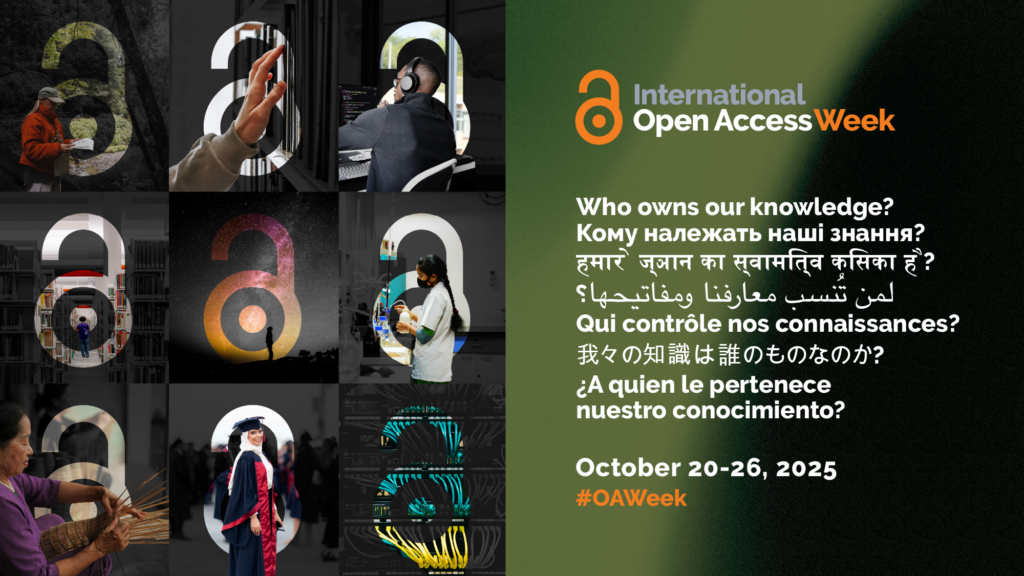With today’s start to International Open Access Week, important conversations will take place across the world exploring how communities can reassert control over the knowledge they produce. This year’s theme of “Who Owns Our Knowledge?” challenges us to reflect on not only who has access to education and research but on how knowledge is created and shared, where it comes from, and whose voices are recognized and valued.
In a time of disruption, this year’s event seeks both to bring our community together in a common conversation about the future we are working toward and to localize these discussions to the particular challenges different regions face and the solutions best tailored to address them. A quick glance at the events organized during the week highlights many common themes: the importance of community-owned and non-commercial research infrastructure, critical analysis of AI adoption, promoting bibliodiversity and multilingualism, and the progress of open research policy implementation, just to name a few.
This year’s theme builds on two years of past events focused on putting “Community over Commercialization,” exploring which approaches to open scholarship prioritize the best interests of the public and the academic community and which do not. These conversations and the actions they’ve catalyzed demonstrate the central role local communities play in advancing open access and open research.
As more Open Access Week events have moved to online or hybrid formats, there is more opportunity than ever for an active global discussion. We hope the selection of locally organized events below will provide a sense of the conversations happening this week and that anyone can join and contribute to. As always, you can participate in the online discussion this week using the hashtag #OAWeek.
A Selection of Locally Organized Open Access Week Events
Monday, October 20th
- Who owns our knowledge? Rethinking Publishing in a Scholar-Led World
- Rethinking Ownership: Non-Commercial Academic Publishing and Open Journal Systems at NCU
- Owning Our Knowledge: Non-Commercial Pathways for Open Access Publishing
- L’accessibilité à la science : quel rôle pour le langage?
- 4th Annual Forum for Open Research – Becoming Open: Capacity Building and Community Collaboration in the Arab World
Tuesday, October 21st
- Who Owns Our Knowledge? An African University Press Perspective
- The politics of knowledge: who controls the story and who has access to it?
- Teaching Roundtable: Who Owns Our Knowledge? The State of Open Access in the Liberal Arts
- Public Access in Transition: Nelson Memo, Federal Licensing, and the Future of Open Scholarship
- Promoting equity in scholarly publishing and Open Access
- Open for All: Advancing Inclusive and Sustainable Open Access Practices
- Knowledge is Power: Who Owns It, Who Shares It, and Why Libraries Matter
Wednesday, October 22nd
- ІV International Conference “Open Science and Innovation in Ukraine 2025”
- Open to AI: Oversharing in a data hungry time
- Community ownership: Relation, reciprocity and responsibility
- Best Practices for No-Fee OA Journals in Latin America
- Who Owns Our Knowledge? How to Maintain Rights to Your Research
Thursday, October 23rd
- We Are Enough: Practical Open Access for Everyone
- Data Cartels, the Companies That Control and Monopolize Our Information
- AI and Knowledge Monopoly
- Who Owns our Knowledge? From Closed to Open Infrastructures for Research Assessment and Metascience / Qui contrôle nos connaissances? Des infrastructures fermées aux infrastructures ouvertes pour l’évaluation de la recherche et la métascience
- Proyectos Wikimedia en bibliotecas, archivos y museos: colaboración por la Ciencia Abierta en América Latina
- The Case for University-Based Publishing – Models, Missions, and Momentum
Friday, October 24th & Later
- Open Science and Citizen Science with #semanticClimate: Open-Software for Knowledge Liberation
- Conversatorio virtual “Soberanía editorial e inteligencia artificial. Perspectivas desde Latinoamérica”
- Our knowledge: our rights
- Promoting Multilingual Open Science in the Humanities and Social Sciences
- ¿Quién Posee Nuestro Conocimiento? Monopolios y Ecosistemas Comerciales en la Ciencia
Note: this is cross-posted on the International Open Access Week website.
